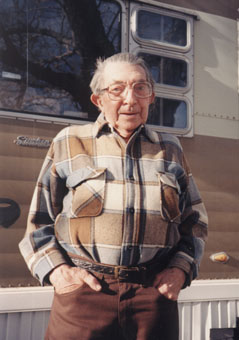

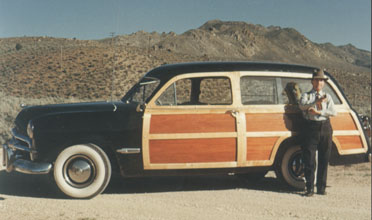
Note: Herb Ringer died on December 11, 1998. This story appeared in the December 1997 issue of The Zephyr.
"Let me show you something."
Herb Ringer paused a moment, then pushed his chair slowly away from the table and stood up. He turned and walked down the darkened hallway to the bedroom of his trailer, the same travel trailer he has lived in since 1954.
On November 21st of that year, the local Reno, Nevada newspaper reported:
GIANT TRAILER HOME SOLD HERE. Sale of what is believed to be the largest trailer home ever sold in Reno was announced today by Mr. Hall of the Old Orchard Trailer Court on South Virginia St. Mr. and Mrs. Joseph Ringer and son Herbert will make their home in the new giant 45 foot "Smoker" trailer at the Old Orchard...The giant trailer will be on display to the public starting Friday.
It was quite an event. Herb saved the clipping, now faded and yellow, and tucked it away with a few thousand other tokens and artifacts of memories that document his life, an adventure now almost 85 years long. Each of those tokens is a story and all one has to do is wave the memento beneath Herb's nose and everything comes back, in extraordinary detail. He looks at a photo and he remembers the date it was taken, the place and the people who were there. But he also remembers the smell of it, the angle of the light, the warmth of the breeze...the feeling of that moment. He wraps himself in the memory and the glow of it warms us both.
His mind is as clear and crisp as the Rocky Mountain streams he spent summers by in years past. But his body is failing him. As I watched Herb disappear into his darkened bed room, I knew he was making his way there by memory as well. His eyesight has deteriorated to the point where he can't even see the vast collection of photographs he took of his favorite places over the last half a century. But he can still enjoy them.
"Herb," I'll ask, "Here's a picture of you on horseback and in the next picture there's a girl on her hands and knees under her horse. What's that all about?"
His worn out eyes sparkle. "Yes!" he smiles, "That's Skippy. That was in the High Sierras in about 1942. She loved her horse and the horse would do anything for her. She bet me she could sit right under it and I didn't believe her. So she climbed down and crawled right under the horse's front legs. So, I took a picture."
I could hear Herb moving things about in his closet and a few moments later he emerged from the bed room, a manila-covered album held tenderly in his hands. He returned to his chair, a bit winded from the short trip, and then placed the large book in my lap. It was the size and shape of a photo album but was covered with brown wrapping paper and held together with yellowed Scotch tape. I opened the binding to the first page. In block letters it read:
1944 RENO, NEVADA STARTED ON XMAS EVE
GIVEN TO ME AS A GIFT THIS BOOK BY MY SON HERBERT.
"This was my father's journal," Herb explained. "I gave the blank book to him a couple of years after I moved my mother and him out here to Nevada from New Jersey. He kept it going until just a few months before his death in 1963. Now my eyes are so bad I can't even read from it any more...Would you read a few of the entries for me?"
I carefully thumbed through the hundreds of handwritten pages; Herb's father carefully recorded the events of their lives with a fountain pen and supplemented the text from time to time with old black and white photographs, newspaper clippings and telegrams.
"Well Herb," I said, "Why don't I start at the beginning?" Here's your father's first entry...
Christmas Day Dec. 25th 1944
We are in Reno, Nevada and it is our second Xmas here. We lived at 988 Watts Street and I have been working at the Washoe Market with Herb. Herb took us on a trip this day . We left Xmas Eve and got home tonight as we had two days off from the store. We left at 7 a.m. for Winnemucca and got there at 3 p.m. We took a hotel overnight so we walked around town and after supper went to the movies. We had a swell time.
"Yes," Herb nodded. "I remember that day so well. That was such a long time ago." He looked at me and strained to see the outline of my face and he smiled again. "It's even been a long time since we met, hasn't it?"
I nodded. "Where have the years gone, Herb?"
I met Herb Ringer in the early autumn of 1981 when I was a seasonal ranger at Arches National Park. In the evenings we used to walk the Devils Garden Campground to collect fees and to say hello. I found fee collection to be a tedious task most of the time, but the opportunity to occasionally meet someone special while making the rounds kept me hopeful. It was like that with Herb.
From the first evening, I found myself fascinated by his stories of the West and the passion with which he told them. After a several days we traded a few details of our personal lives. I was enduring the aftermath of a divorce that summer and when he asked me if I were married, I gave Herb the two minute version of the ordeal.
Herb placed his hand on my shoulder and nodded empathetically. "Yes," he said. "I know...I know what you're going through. I was married once..."
His eyes drifted away from me as he remembered and talked and it appeared as though his gaze had settled on the distant La Sal Mountains. But I had the feeling his stare was cutting through the haze of time, not miles.
"...1938. I was married for a short time to a local girl. I traveled all the way to Reno, Nevada from New Jersey and got a divorce."
His eyes welled with tears. "Oh I loved her...I still love her, I guess."
I looked at this man, still staggered by a sense of loss, more than 40 years after his marriage failed, and I selfishly thought to myself, am I going to still feel this bad in another 40 years? The prospect of it made me shudder. But from that moment, Herb and I became kindred spirits.
Herb told me about his marriage. They had met several years earlier and were married on October 25, 1938. "She was beautiful...a beautiful girl. But we just couldn't hit it off right, and rather than destroy each other, I decided I would have to make the move to end it." The details are still too painful for him to discuss but eventually Herb traveled all the way from his home in Ringoes, New Jersey to Nevada and seek a divorce. In those days, Nevada was the only state in the country that had fairly liberal divorce requirements and Herb simply didn't want to go through the painful process of a divorce in his own home town.
After the divorce was finalized in Carson City, Herb returned to New Jersey. He had borrowed $1000 to make the trip and so he went right to work to re-pay the loan. In six months he was debt-free but something unexpected had happened to him during the five months he spent in Reno; now he found himself dreaming and day-dreaming of the West he had left behind. He had never seen such magnificent open country and now he realized he could not bear to live without it.
"I had the great urge to return to the Western Way of Life. And so I did."
For the third time in two years, Herb loaded up the '36 Ford sedan and headed West in the winter of 1941, just before Pearl Harbor. He would never return East to live again. "From then on," he remembered, "I was a tourist when I visited New Jersey."
Herb set out to find work and make a home in this strange new land. He had learned the grocery business at a small store near Ringoes; it was Herb's first job and he loved it. Always the gentle gentleman, even then, Herb remembers that "I enjoyed being able to help people. My parents always taught me to be courteous and polite but this allowed me to do something for others." So he applied for a job at the Washoe Market in Reno. He would stay there for the next 18 years.
And Herb set out at once to document his new life, although he failed to see the significance of it at the time. He loved to take pictures and he loved to write down his impressions and memories. He never considered himself proficient at either, but his efforts prove otherwise. Over the next 40 years, Herb took almost 10,000 photographs of an American West that simply doesn't exist anymore. And his journals fill dozens of spiral notebooks. For him, it was a simple but enjoyable exercise; even Herb could not dream or predict the changes that lay ahead.
But while Herb basked in the excitement and adventure of this new home in Nevada and scribbled notes and took pictures, he could not forget his parents, who still lived in New Jersey. His mother and father had seen hard times during the Depression and now, practically penniless, they barely survived on the Ringer family's farm in a small house they had built several years earlier.
I don't know that I have ever met anyone who's devotion and loyalty and sense of responsibility to family was as strong as Herb Ringer's. And so, two years after his own migration to Nevada, he returned east yet again and brought his mother and father back to Reno with him. "They did so much for me," he once said. "Letting them stay with me for the remainder of their lives was the least I could do." His memories of childhood are still vivid and sweet, but sometimes touched by a hint of sadness. Herb remembers the early days...
"I was born on July 15, 1913 in Brooklyn, New York at 80 Cornelius Street. We were living in my grandparents' apartment while they traveled to Europe for a last visit. We moved to Cincinnati, Ohio not long after that. My father had a contract with the symphony starting in October. My father played French horn and my mother took care of me. I really don't remember much until I was four, but that is where my life really began.
"When I was about four my father had an engagement to play the summer season out in Colorado Springs with a local band, the Colorado Midland Band, owned by the Colorado Midland Railroad. So we journeyed by train across the country to Colorado and my father rented a small cabin there. That cabin, by the way, stood until the 1980s when it was torn down for a new apartment complex. We spent a very enjoyable summer there. We loved the outdoors and we hiked every day. I remember they bought me a small red tin wagon which could be hauled quite easily to places like North and South Cheyenne Canyons.
"My father only had to play with the band in the evenings at the park so we had a lot of time to see many things. My mother and I sat on the grassy lawn and listened to the concerts each evening. We were there for most of the summer; then we'd return to Cincinnati and he'd play with the orchestra. I went to my first concert when I was five and I remember that with a shaking finger my father told me to be very quiet and not talk or rattle a paper or in any way disturb the other people who had come to enjoy the concert.
"We lived at 123 Mason Street in Mt. Auburn, a part of Cincinnati, but later the landlord bought a large three story building with a cupola on Auburn Avenue, and we moved into an apartment there. It had a huge living room about forty feet long and a bathroom and kitchen, and so we were safely ensconced there and enjoyed several years at that location. It had a large yard in back and it had a playground atmosphere where I could play. My father always brought me toys when he was on trips with the symphony. One particular set of toys was a set of little colorful Swiss buildings and I placed them around my train set. They lasted me for forty years.
"So I had many enjoyable days in that yard and I had the company of lots of squirrels who served as constant companions. But I didn't have a lot of friends. I was a loner, even then. I learned to entertain myself quite well.
"That is partly due to my father, I suppose. He devoted his life to his French horn and practicing it to perfection and he didn't want to be interrupted by screaming children. I could play in the house and I had toys to play with beyond measure but I had to handle them gently. That's why they lasted me countless years. But I was pretty much alone. I didn't have the knack of making friends.
"When I was 12 I contracted rheumatic fever and it was treated much differently in those days. I had aspirations to follow in my father's footsteps and be a musician but when I got sick the first thing they did was take me out of school and my musical aspirations ended entirely. It was thought that I should be kept as quiet as possible; sometimes they kept me in bed for six months at a time. And yet, I didn't feel that badly...just tired I guess.
"And then, when I was 13 years old, we left Cincinnati forever, thanks to the murderous intent of the symphony conductor Fritz Reiner, who disliked all American musicians. He employed European musicians thinking they were better equipped to perform the great symphonic selections than their American counterparts. My father had already played 16 years with the symphony and it was a terrible defeat when he lost his position there. Up until the last three years, when Reiner arrived, he had loved his work, associating with all the great classical musicians of the world. So we moved back to New York.
"For a couple years, my father played with some of the large theater organizations. He played for the Lexington Opera House and for some movies. He played with many pit orchestras...he once played with Major Bowes of the Amateur Hour. He saw many good and many really poor performers on the stage. He often saw many of those poor performers 'get the hook.'
"But he gave it all up, the thing he loved most---his music---for me, and we moved to the country to the family farm. They thought the country life, a quieter atmosphere would help my heart condition. And it did. It worked wonders. Soon I was able to run...run across the fields. Plus I was working daily on the farm.
"But my father had no way of making a living. No orchestras. No bands. Nothing. So we tried to make a living off the poultry we raised. But the price of poultry feed kept rising and we could not keep up.
"By the late 1930s, they were just barely getting by. And so, considering all they had done for me, they came to live in Nevada in 1942. My father hoped that perhaps he'd find an orchestra to play with in Reno, but it never happened. And sadly, my father never really played professionally again."
I turned another page of the journal and read a passage or two to myself. Herb's hearing is not much better than his eyesight these days and he had leaned his ear close to me as I recited from his father's words. Now he wasn't hearing anything at all.
"Let's stop for awhile," he suggested. "I'm hungry. How about some dinner?"
I nodded. Herb went to the refrigerator, pulled out a pan of pound cake, a quart of strawberries, and a can of whipped cream. "If you don't mind," he said, "let's just go straight to the dessert tonight."
"We're kindred spirits in more ways than I ever dreamed possible," I answered. "We're two divorced guys trying to prove we can live a healthy and active life eating nothing but junk food. But you have about a 40 year lead on me, Herb."
"I didn't get all of that...miserable hearing aid," Herb grumbled, "but I got most of it...don't you want some more whipped cream on that?"
In many ways Herb began life all over again when he made the move to Nevada. And for Herb's mother and father it was a whole new world. Except for the summer trips to Colorado Springs when Herb was a small boy, the Ringers had not ventured farther west than Cincinnati. Now suddenly Joseph and Sadie Ringer were making a new home in one of the wildest and most remote parts of the American West.
Until 1942, neither of Herb's parents had ever camped out a day of their lives. Herb changed all that. The parents scarcely had time to unpack before Herb bundled them into his Ford and took them for a day trip to Virginia City. It would be the first of thousands of journeys, both short and long, to the remote and hidden corners of the West. In order to make ends meet, Mr. Ringer went to work at the Washoe Market with Herb who was by now the store manager. Even Sadie helped out during busy times. They worked six days a week, month after month. But they never seemed to squander a moment of their free time.
On Saturdays, after locking up the market for the weekend, the Ringers hit the road. Herb had specially equipped the Ford so that his parents could sleep across the back seat. He pitched a canvas tent for himself and with a cook box and stove that he permanently kept in the trunk, the Ringers camped out almost every Saturday night (weather and season permitting) for years. They explored ghost towns in the Nevada desert and searched for the remains of the long abandoned Virginia & Truckee Railroad. In the summer they sought the cool relief of the High Sierras and, according to Herb's own count, made 120 trips to their favorite mountain getaway, Hope Valley. But their first overnight sojourn to Hope Valley, in June 1945, gave them more escape from the heat than they had in mind. Herb's father faithfully recorded the day...
"June 5, 1945: Herb took us up to Hope Valley, Calif. to camp out there overnight for the first time. It was cold so we built a big fire and stood around it until it was time to go to bed. We all slept in the car & when we got up in the morning there was ice in our pots. It was 22 degrees. Where we slept it was over 7000 feet. It turned out to be a fine day and it got up to 82 degrees."
And that is how Herb and his parents lived for much of the next 20 years. In addition to their weekend wanderings, they traveled to the Rocky Mountains, to the Pacific Northwest, to California, to Alberta, Canada, and sometimes back east to New Jersey to re-establish contact with the family. But they always seemed ready to travel whenever the opportunity presented itself. Even his mother, who by the time they made the move to Reno was in her 60s, adapted remarkably well to the outdoor life. To this day, Herb marvels at the way Sadie embraced camping and endured the lack of amenities. "I never heard her complain."
The Ringers owned a succession of vehicles. They sold the '36 Ford in 1945 and bought a '41 Lincoln Zephyr. And then a '46 Ford. And a '49 'Woodie.' And a '54 Ford pickup with one of the first camper shells ever made. They crisscrossed the West, again and again and traveled hundreds of thousands of miles in a part of America that was still asleep and undiscovered.
And Herb kept taking pictures. From the beginning, he used 35mm cameras with excellent optics and later purchased a large-frame (2 1/4 inch) camera. When Kodak introduced its Kodachrome color film in 1946, Herb was one of its first customers and used it exclusively (Most of the black & white reproductions in the Zephyr are from those extremely clear Kodachrome slides).
Herb photographed the mountains and the deserts and the canyons. But he also photographed the small towns, the gas stations, the cafes, the road houses, and the people he met along the way. He created a portfolio of life in the West in the last years before Industrial Tourism grabbed it by the throat. His work is testimony and tribute to another time.
In 1963, Herb's father was diagnosed with cancer and Herb spent most of his life savings, trying to save his father's life. But Joseph Ringer died later in the year. In 1964, Medicare was enacted but it came too late for the Ringers. Herb and his mother continued to travel, to places as far away as the Canadian Rockies, even though Sadie was now in her late 80s. In July 1974, while at Banff National Park in Alberta, Herb suffered a massive heart attack. As he was being rushed by ambulance to a nearby hospital, the shock of seeing Herb unconscious and in critical condition was too much for his mother. Sadie was struck down by a cerebral hemorrhage; while Herb's heart slowly healed, Sadie died a few weeks later. She was 92 years old. Herb had just turned 61.
Herb was devastated by the loss and discouraged by his own health problems. But one morning he arose from bed, looked out the window at the beautiful fall day that awaited him and decided he would not let his heart attack or the grief that still gripped him ruin the remainder of his life. "It was simply a case of mind over matter," Herb recalled.
He retired from his grocery job, re-located the trailer to Fallon, sixty miles southwest of Reno, and determined to make the most of every remaining day of his life. Now he would spend every possible moment exploring the West that he loved so much.
A routine, if you can call it that, began to emerge. He started packing up his 1970 Ford Econoline Camper late in January of each year. By the first week of February, Herb was ready to travel. He always headed south for warmer weather and stayed at that latitude until spring. Sometimes he journeyed all the way to the east coast; sometimes he'd only go as far as the midwest. But he was almost always back in his beloved Colorado by June.
And every autumn, I could expect Herb Ringer to arrive at the Devils Garden Campground along with his Burmese cat, Nami. He became a part of my routine as well. I could not imagine an October without Herb. Once nine years ago, I got a hastile written note from Herb; he feared he would most likely miss our annual rendezvous. Early in the summer, he had experienced some worrisome health symptoms and immediately drove himself back to Fallon. Herb was diagnosed with colon cancer and underwent major surgery the next day. A couple of weeks later, Herb wrote again to let me know he had survived the operation, but remained skeptical about his prospects.
But October came and here came Herb. "Well," he complained gently, "I already wasted part of my summer. I wasn't about to let it ruin the entire year." Mind over matter.
And so the years passed and each visit from Herb brought more stories and pictures and memories. Herb became my Time Machine. I could say to Herb, "OK, it's the summer of 1941 and you're getting ready to head west again from New Jersey." And Herb will pause briefly, gather his thoughts and say, "Yes. I remember I left about eight in the morning. It was a clear cool day. Not too hot. I traveled north on Route 22 and stopped for breakfast at a little diner." It was like that.
In the summer of 1994, I met Herb in Crested Butte, Colorado and we camped by a lake near Kebler Pass. But something wasn't right and Herb was worried. Without any warning, his eyesight had begun to deteriorate. He had recently been to an opthamologist who saw no problem so it seemed unlikely that his vision could go so rapidly. But Herb was concerned enough to cut his summer trip short. He insisted he could still see well enough to drive and so we reluctantly watched him take to the road again in his camper.
By the time he reached Fallon, he could barely make out the road. And an eye examination brought bad news. Irreversible corneal deterioration had robbed Herb of most of his sight and the condition would grow even worse. After more than a million miles, Herb's driving days came abruptly to a halt. He parked his beloved Econoline Camper and never drove it again.
I could not imagine how Herb would survive this sudden loss of mobility. Traveling was his passion and his life. All his friends lived along thousands of miles of highway, in large cities and small towns across America. He had not spent more than three months at a time in Fallon since he moved there in 1974.
I should have known better. Herb Ringer---the Unflappable Man. He had a phone installed for the first time in 20 years and we had an amplifier attached to it to aid his hearing problem. He made new friends. Adjusted to a new chapter. Mind over matter.
But I worry about him. With his eyesight limited, he can no longer read and his hearing isn't much better and sometimes I wonder how he gets through the day. So I asked him once: Herb what do you do here all day with no tv to watch and no books to read?
He said, "I think about my life and where I've been and the people I've met.
"I can still see everything."
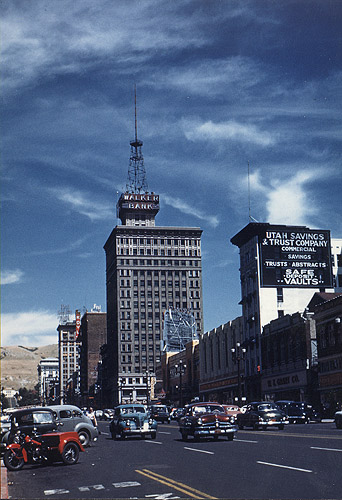
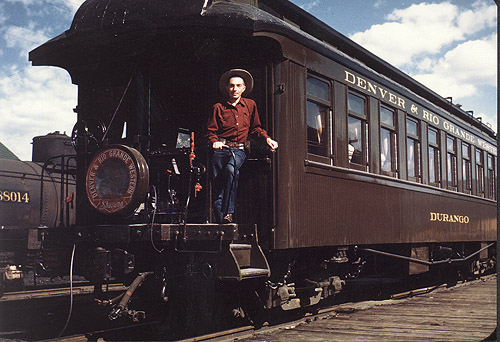
Herb in Durango - 1948
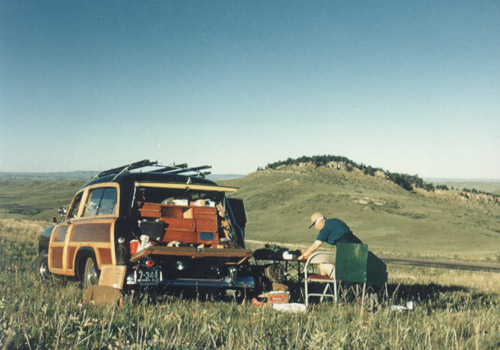
Camping out - 1950
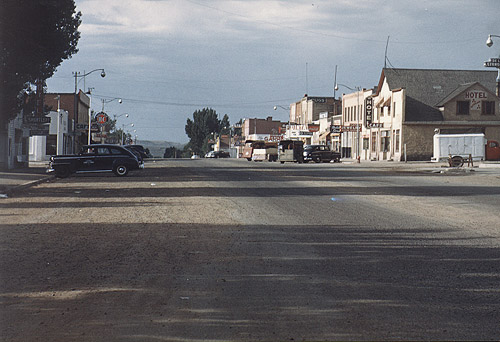
Roosevelt, Utah - late 1940's